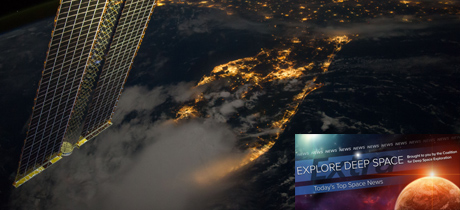In Today’s Deep Space Extra… In an expression of bipartisan concern for the future of the International Space Station, U.S. senators Bill Nelson and Ted Cruz are calling on NASA to provide details of an overdue International Space Station strategy to transition the orbiting science lab from NASA to private sector supervision by 2024-25. China will delay from 2018 to 2020 the launch of the first module of its new space station. China and Russia sign an agreement to cooperate on lunar exploration.
Human Space Exploration
Senators Press Administration for ISS transition plan
Space.com (3/4): Previously, U.S. Senators Bill Nelson, of Florida, and Ted Cruz, of Texas, sounded a bipartisan call on the White House Office of Management and Budget to resist a premature cancellation of International Space Station operations before activities can be transferred to the private sector. Under provisions of the NASA Transition Authorization Act of 2017, signed into law in March of last year, NASA is to provide a space station transition strategy. Nelson, a Democrat, and Cruz, a Republican, are seeking an update on the transition plan’s status from NASA acting administrator Robert Lightfoot. The yet-to-be-released plan was to be completed by early December.
Launch of first Chinese space station module delayed to 2020
GB Times of Finland (3/5): The launch of the first of three modules forming the core of a new Chinese space station will be delayed from 2018 to 2020, according to the report, based on statements initially provided to the China News Service. The three core modules are to be joined by a pair of experiment modules around 2022. Crews of three astronauts are to keep the Chinese station permanently staffed for a decade.
Orlando Sentinel/Los Angeles Times (3/4): Former NASA astronaut Sandra Magnus, who lived and worked aboard the International Space Station, explains how a transition of Space Station operations to the U.S. private sector might work to increase access to more users, while keeping NASA as a client and freeing the U.S. space agency to pursue new human deep space objectives. “It’s a question of, does NASA own the building or is it leasing the building?” said Magnus, who lived on the space station for 4 1/2 months in 2008 and 2009.
China to recruit civilian astronauts, boost crewed missions
Associated Press via ABC News (3/4): In order to step up the flight rates of missions with astronauts, China’s military backed space program will recruit civilian astronauts. The objective is two of the missions annually. Beijing plans to soon begin assembly of an independent space station, Tiangong-1.
Space Science
China, Russia sign deal on lunar exploration at global space agency meeting
GB Times of Finland (3/3): During the International Space Exploration Forum in Tokyo, the Russian and Chinese space agencies agreed to possible cooperation in the exploration of the moon’s south pole region. China is preparing for the launch of a lunar communications relay satellite by June and a lander and rover by year’s end. Plans by China for a sample return mission have been delayed by a 2017 launch failure of the Long March 5 rocket.
A floating ‘brain’ will assist astronauts aboard the Space Station
Space.com (3/2): Airbus and IBM have joined to develop the first Artificial Intelligence experiment for crews of the International Space Station. The 3-D printed CIMON will be a kind of floating brain. Floating free in weightlessness, the spherical device will feature a round face to display data or a smile. Delivery to the Space Station is expected in mid-2018 and in time for interactions with veteran European Space Agency astronaut Alexander Gerst.
Other News
NASA heads back to space leaderless
Bloomberg News (3/2): At a critical point in its future and more than a year into the Trump Administration, NASA does not yet have a U.S. Senate confirmed leader. Robert Lightfoot, a NASA veteran, is leading the agency as acting administrator. Meanwhile, the nomination of Oklahoma congressman Jim Bridenstine to become administrator awaits action by the Senate.
China to conduct sea launches for commercial payloads this year
Global Times of China (3/3): Among its ambitious rocket launch plans for 2018, China intends to launch commercial satellites from ocean launch platforms. Long March-11, a solid fuel rocket, will participate in the initiative. The strategy would move the launches closer to the equator for more efficiency.
BE-4 engine tests continue as ULA waits to make Vulcan engine decision
Coalition Member in the News – United Launch Alliance
Space News (3/3): Blue Origin reports progress in the development of its powerful BE-4 rocket engine, which is to be integrated into the company’s New Glenn rocket. The BE-4 is also under consideration by United Launch Alliance as the rocket engine for its Vulcan rocket, a successor to the Atlas 5 and Delta 4 launch vehicles. The Atlas relies on imports of Russia’s RD-180 rocket engine.
No. 42018: Action plan approved for next Ariane 5 launches
European Space Agency (3/2): Arianespace’s most recent Ariane 5 launch, January 25, steered off course because of improper values programmed into the rocket’s inertial measurement units, or guidance system. New pre-launch measures are being implemented to avoid a repeat. All of the Ariane 5 payloads reached orbit during the late January mission but will require a longer time to reach their intended geosynchronous orbit destinations. Future Ariane 5 payloads include the James Webb Space Telescope (JWST).
Major Space Related Activities for the Week
Major space related activities for the week of March 4-10, 2018
Spacepolicyonline.com (3/4): Lots in Washington this week on NASA’s 2019 budget proposal, both before Congress and other Washington area venues. Acting NASA Administrator Robert Lightfoot is to testify Wednesday before the Space Subcommittee of the House Science, Space, and Technology Committee on the spending plan.

